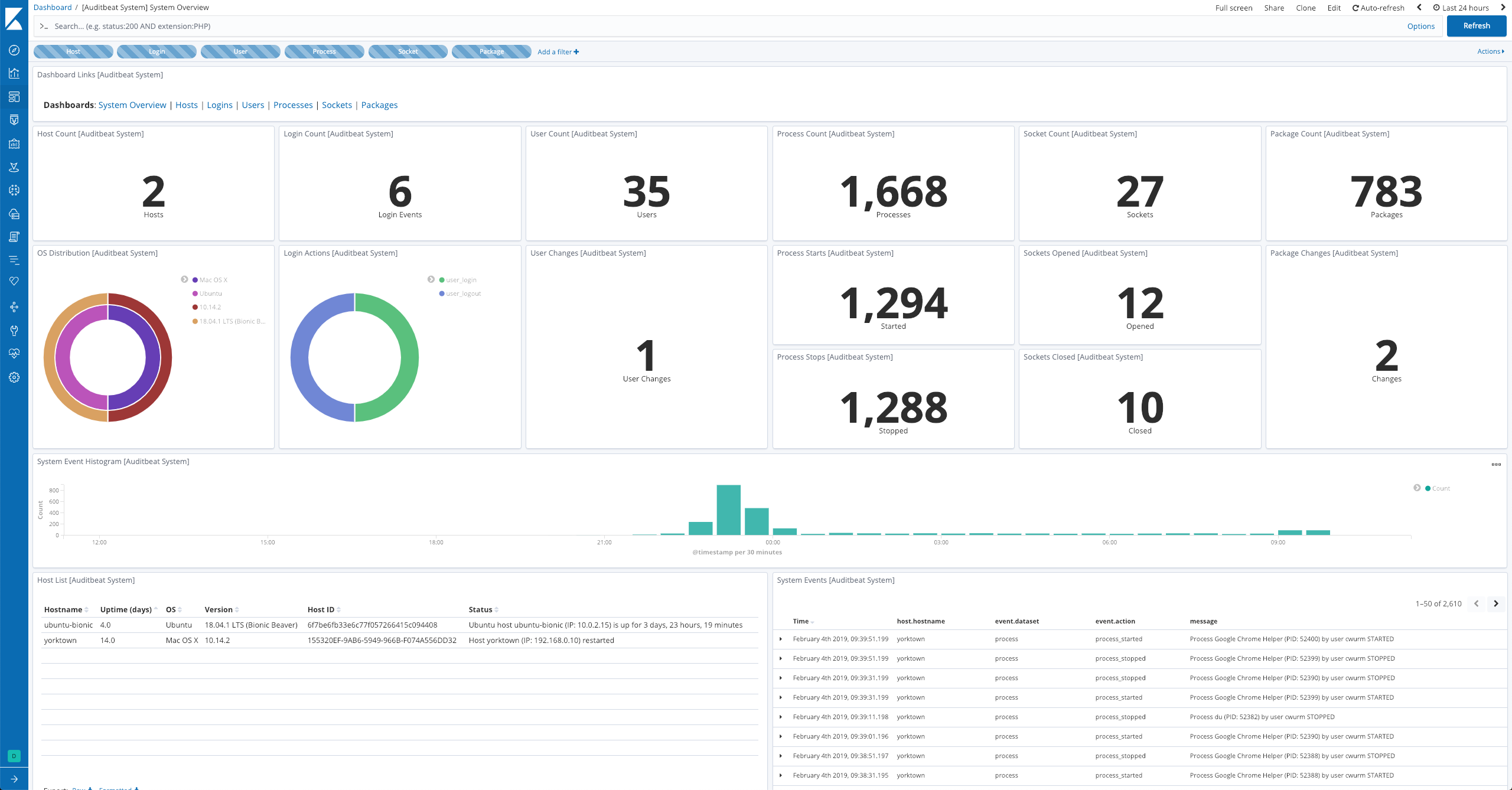System Module
This functionality is in beta and is subject to change. The design and code is less mature than official GA features and is being provided as-is with no warranties. Beta features are not subject to the support SLA of official GA features.
The system module collects various security related information about a system. All datasets send both periodic state information (e.g. all currently running processes) and real-time changes (e.g. when a new process starts or stops).
The module is fully implemented for Linux on x86. Currently, the socket module is not available on ARM. Some datasets are also available for macOS (Darwin) and Windows.
Each dataset sends two kinds of information: state and events.
State information is sent periodically and (for some datasets) on startup. A state update will consist of one event per object that is currently active on the system (e.g. a process). All events belonging to the same state update will share the same UUID in event.id.
The frequency of state updates can be controlled for all datasets using the state.period configuration option. Overrides are available per dataset. The default is 12h.
Event information is sent as the events occur (e.g. a process starts or stops). All datasets are currently using a poll model to retrieve their data. The frequency of these polls is controlled by the period configuration parameter.
This module populates entity_id fields to uniquely identify entities (users, packages, processes…) within a host. This requires Auditbeat to obtain a unique identifier for the host:
Windows: Uses the
HKLM\Software\Microsoft\Cryptography\MachineGuidregistry key.macOS: Uses the value returned by
gethostuuid(2)system call.Linux: Uses the content of one of the following files, created by either
systemdordbus:- /etc/machine-id
- /var/lib/dbus/machine-id
- /var/db/dbus/machine-id
Under CentOS 6.x, it’s possible that none of the files above exist. In that case, running dbus-uuidgen --ensure (provided by the dbus package) will generate one for you.
The module comes with a sample dashboard:

This module has some configuration options for controlling its behavior. The following example shows all configuration options with their default values for Linux.
It is recommended to configure some datasets separately. See below for a sample suggested configuration.
- module: system
datasets:
- host
- login
- package
- process
- socket
- user
period: 10s
state.period: 12h
socket.include_localhost: false
user.detect_password_changes: true
This module also supports the standard configuration options described later.
state.period- The interval at which the datasets send full state information. This option can be overridden per dataset using
{{dataset}}.state.period. user.detect_password_changes- If the
userdataset is configured and this option is set totrue, Auditbeat will read password information in/etc/passwdand/etc/shadowto detect password changes. A hash will be kept locally in thebeat.dbfile to detect changes between Auditbeat restarts. Thebeat.dbfile should be readable only by the root user and be treated similar to the shadow file itself.
You can specify the following options for any Auditbeat module.
module- The name of the module to run.
datasets- A list of datasets to execute.
enabled- A Boolean value that specifies whether the module is enabled.
period- The frequency at which the datasets check for changes. If a system is not reachable, Auditbeat returns an error for each period. This setting is required. For most datasets, especially
processandsocket, a shorter period is recommended. fields- A dictionary of fields that will be sent with the dataset event. This setting is optional.
tags- A list of tags that will be sent with the dataset event. This setting is optional.
processors-
A list of processors to apply to the data generated by the dataset.
See Processors for information about specifying processors in your config.
index-
If present, this formatted string overrides the index for events from this module (for elasticsearch outputs), or sets the
raw_indexfield of the event’s metadata (for other outputs). This string can only refer to the agent name and version and the event timestamp; for access to dynamic fields, useoutput.elasticsearch.indexor a processor.Example value:
"%{[agent.name]}-myindex-%{+yyyy.MM.dd}"might expand to"auditbeat-myindex-2019.12.13". keep_null- If this option is set to true, fields with
nullvalues will be published in the output document. By default,keep_nullis set tofalse. service.name- A name given by the user to the service the data is collected from. It can be used for example to identify information collected from nodes of different clusters with the same
service.type.
Processes and sockets can be short-lived, so the chance of missing an update increases if the polling interval is too large.
On the other hand, host and user information is unlikely to change frequently, so a longer polling interval can be used.
- module: system
datasets:
- host
- login
- package
- user
period: 1m
user.detect_password_changes: true
- module: system
datasets:
- process
- socket
period: 1s
The System module supports the common configuration options that are described under configuring Auditbeat. Here is an example configuration:
auditbeat.modules:
- module: system
datasets:
- package
period: 2m
- module: system
datasets:
- host
- login
- process
- socket
- user
# How often datasets send state updates with the
# current state of the system (e.g. all currently
# running processes, all open sockets).
state.period: 12h
# Enabled by default. Auditbeat will read password fields in
# /etc/passwd and /etc/shadow and store a hash locally to
# detect any changes.
user.detect_password_changes: true
# File patterns of the login record files.
login.wtmp_file_pattern: /var/log/wtmp*
login.btmp_file_pattern: /var/log/btmp*
- Installed, updated, and removed packages
- The frequency at which the datasets check for changes
- General host information, e.g. uptime, IPs
- User logins, logouts, and system boots.
- Started and stopped processes
- Opened and closed sockets
- User information
The following datasets are available: